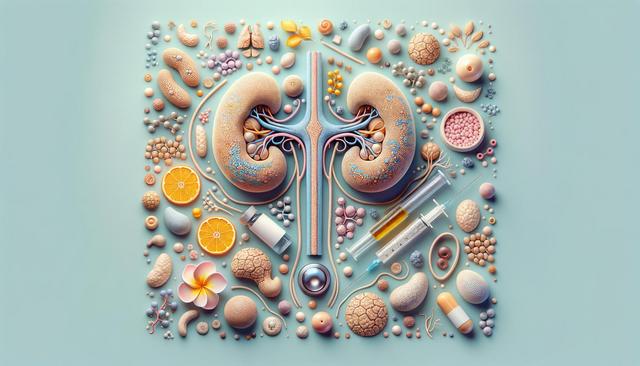Genetic Disorders: How CAH Affects Women
Congenital Adrenal Hyperplasia (CAH) is a genetic disorder that can significantly impact women’s health and quality of life.

Understanding CAH and Its Genetic Basis
Congenital Adrenal Hyperplasia (CAH) is a group of inherited genetic disorders affecting the adrenal glands, which are responsible for producing essential hormones like cortisol, aldosterone, and androgens. In women, CAH is typically caused by mutations in the CYP21A2 gene, which leads to a deficiency in the 21-hydroxylase enzyme. This enzyme deficiency disrupts normal hormone production, resulting in an overproduction of androgens (male hormones) and a deficiency in cortisol and sometimes aldosterone. Since CAH is autosomal recessive, an individual must inherit two copies of the defective gene—one from each parent—to develop the condition. Women with CAH may experience a range of symptoms that vary in severity, depending on the form of the disorder, which can be classified into classic and non-classic types.
Physical and Hormonal Effects in Women
Women with CAH often face unique physical and hormonal challenges due to the elevated levels of androgens in their bodies. These effects can manifest early, even during fetal development. In classic CAH, females may be born with ambiguous genitalia due to excess androgen exposure in utero. In adolescence and adulthood, common symptoms may include:
- Irregular or absent menstrual cycles
- Excessive body and facial hair (hirsutism)
- Severe acne
- Infertility or reduced fertility
- Early onset of puberty or rapid growth in childhood followed by early closure of growth plates
In contrast, non-classic CAH tends to present milder symptoms, often emerging later in life, and may go undiagnosed for years. Nevertheless, both forms can significantly affect a woman’s physical development and endocrine balance, necessitating proper diagnosis and management.
Psychological and Social Impacts
Beyond the physical manifestations, CAH can also have profound psychological and social implications for women. Living with a chronic condition that impacts physical appearance and reproductive health can influence self-esteem, body image, and mental well-being. Adolescents with CAH may experience unique stressors related to their appearance and gender identity, especially if the diagnosis was made late or if they underwent surgeries in early life. The psychological impacts may include:
- Social anxiety or withdrawal
- Depression or mood disorders
- Feelings of isolation or difference from peers
- Concerns around sexuality and intimacy
Support from mental health professionals, peer support groups, and understanding medical teams can help mitigate these impacts. Open conversations and education about CAH are essential in fostering a supportive environment for affected individuals and their families.
Fertility and Reproductive Health
Fertility is a common concern for women with CAH, particularly in the classic form of the disorder. The hormonal imbalances associated with CAH can interfere with ovulation and menstrual regularity, reducing the likelihood of conception. However, many women with CAH can conceive with appropriate medical support. Management strategies may involve:
- Glucocorticoid therapy to suppress excess androgen production and restore ovulation
- Fertility treatments such as ovulation induction or assisted reproductive technologies (ART)
- Monitoring of hormonal levels throughout the menstrual cycle
For women with non-classic CAH, fertility issues may still arise but are often less severe. Regular consultations with endocrinologists and gynecologists familiar with CAH are crucial in developing a personalized reproductive health plan. Early intervention and tailored care can improve outcomes and help women achieve their reproductive goals.
Managing CAH in Daily Life
Effective management of CAH in women involves a multidisciplinary approach that includes endocrinology, gynecology, psychology, and sometimes surgery. Daily life with CAH requires consistent medical monitoring, hormone therapy, and lifestyle adjustments. Women with CAH are often prescribed glucocorticoids to replace deficient cortisol and regulate androgen levels. In some cases, mineralocorticoids are also needed to manage salt balance and blood pressure. Important aspects of daily management include:
- Adherence to prescribed medication schedules
- Routine blood tests to monitor hormone levels
- Awareness of stress dosing during illness or surgery
- Education on symptom recognition and emergency care
Support from healthcare providers and patient advocacy organizations can empower individuals with CAH to lead full, active lives. With the right care and support, many women with CAH can manage their symptoms effectively and pursue their personal and professional aspirations.
Conclusion: Living Well with CAH
For women living with Congenital Adrenal Hyperplasia, understanding the genetic, physical, and emotional aspects of the condition is essential to achieving a good quality of life. While CAH presents ongoing challenges, advancements in diagnosis, hormonal therapies, and comprehensive care have greatly improved health outcomes. Women affected by CAH benefit from early intervention, continuous education, and a supportive care network. By addressing both the medical and psychological dimensions of the disorder, individuals can navigate life with confidence and resilience.